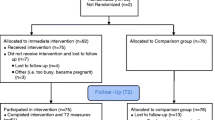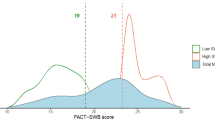Abstract
Background: Recent literature has indicated that a significant percentage of oncology patients describe finding some benefit (e.g., improved personal growth, sense of meaning, and enhanced interpersonal relationships) in the cancer experience. However, few studies have investigated the role of group-based psychosocial interventions in improving benefit finding (BF), and virtually none have investigated these constructs in men.Purpose: This study examined whether a cognitive-behavioral stress management (CBSM) intervention improves BF and quality of life (QoL) in men recovering from treatment for localized prostate cancer.Methods: Participants in this study were 191 men (M age = 65.1) treated with radiation or radical prostatectomy for clinically localized (i.e., Stage I or II) prostate cancer. Participants were primarily non-Hispanic White (40%) or Hispanic (41 %), followed by Black (18%) and other ethnicity (1 %), were an average of 65.1 years old (SD = 7.7), and earned an average of $47,800 annually (SD = $41,000). Participants were randomized to either a 10-week group-based cognitive-behavioral stress management intervention or a half-day educational seminar as a control condition. All participants provided demographic information and completed the Positive Contributions Scale-Cancer to assess BF, the Functional Assessment of Cancer Therapy to measure quality of life, and a measure of perceived stress management skills. Structural equation modeling was utilized for all analyses.Results: Results indicated that the CBSM condition led to increases in BF and QoL and that these changes were mediated by the development of stress management skills.Conclusions: Results support the use of group-based cognitive-behavioral interventions in promoting QoL and BF in this population.
Similar content being viewed by others
References
American Cancer Society:Cancer Facts & Figures 2004. Atlanta, GA: Author, 2004.
Tewari A, Johnson C, Divine G, et al.: Long-term survival probability in men with clinically localized prostate cancer: A case-control, propensity modeling study stratified by race, age, treatment and comorbidities.Journal of Urology. 2004,171:1513–1519.
Post P, Kil P Hendrikx A, et al.: Comorbidity in patients with prostate cancer and its relevance to treatment choice.British Journal of Urology International. 1999,84:652–656.
Schapira M, Lawrence W, Katz D, et al.: Effect of treatment on quality of life among men with clinically localized prostate cancer.Medical Care. 2001,39:243–253.
Walsh P Partin A, Epstein J: Cancer control and quality of life following anatomical retropubic prostatectomy: Results at 10 years.Journal of Urology. 1994,152:1831–1836.
Debruyne F, Beerlage H: The place of radical prostatectomy in the treatment of early localized prostate cancer.Radiotherapy and Oncology. 2000,57:259–262.
Eton DT, Lepore SJ: Prostate cancer and health-related quality of life: A review of the literature.Psycho-Oncology. 2002,11:307–326.
Penson D, Litwin M, Aaronson N: Health related quality of life in men with prostate cancer.Journal of Urology. 2003,169:1643–1661.
Stanford J, Feng Z, Hamilton A, et al.: Urinary and sexual function after radical prostatectomy for clinically localized prostate cancer: The Prostate Cancer Outcomes Study.Journal of the American Medical Association. 2002,83:354–360.
Schover L, Fouladi R, Warneke, C, et al.: Defining sexual outcomes after treatment for localized prostate carcinoma.Cancer. 2002,95:1773–1785.
Penson D, Feng Z, Kuniyuki A, et al.: General quality of life 2 years following treatment for prostate cancer: What influences outcomes? Results from the prostate cancer outcome study.Journal of Clinical Oncology. 2003,21:1147–1154.
Bacon C, Giovannucci E, Testa M, et al.: The association of treatment-related symptoms with quality-of-life outcomes for localized prostate carcinoma patients.Cancer. 2002,94:862–871.
Clark J, Inui T, Silliman R, et al.: Patient's perceptions of quality of life after treatment for early prostate cancer.Journal of Clinical Oncology. 2003,21:3777–3784.
Kornblith, A, Herr H, Ofman U, et al.: Quality of life of patients with prostate cancer and their spouses. The value of a data base in clinical care.Cancer. 1994,73:2791–2802.
Clark J, Talcott J: Symptom indexes to assess outcomes of treatment for early prostate cancer.Medical Care. 2001,39:1118–1130.
Thornton A, Perez M, Meyerowitz B: Patient and partner quality of life and psychosocial adjustment following radical prostatectomy.Journal of Clinical Psychology in Medical Settings. 2004,11:15–30.
Manne S, Babb J, Pinover W, et al.: Psychoeducational group intervention for wives of men with prostate cancer.Psycho-Oncology. 2004,13:37–46.
Lintz K, Moynihan C, Steginga S, et al.: Prostate cancer patients’ support and psychological care needs: Survey from a non-surgical oncology clinic.Psycho-Oncology. 2003,12:769–783.
Steginga S, Occhipinti S, Dunn J, et al.: The supportive care needs of men withprostatecancer.Psycho-Oncology. 2001,10:66–75.
Pirl W, Siegel G, Goode M, Smith M: Depression in men receiving androgen deprivation therapy for prostate cancer: A pilot study.Psycho-Oncology. 2002,11:518–523.
Ritterband L, Spielberger C: Depression in a cancer patient population.Journal of Clinical Psychology in Medical Settings. 2001,8:85–93.
Zabora J, Brintzenhofeszoc K, Curbow B, et al.: The prevalence of psychological distress by cancer site.Psycho-Oncology. 2001,10:19–28.
Tomich P, Helgeson V: Is finding something good in the bad always good? Benefit finding among women with breast cancer.Health Psychology. 2004,23:16–23.
Katz R, Flasher L, Cacciapaglia H, Nelson S: The psychosocial impact of cancer and lupus: A cross validation study that extend the generality of “benefit finding” in patients with chronic disease.Journal of Behavioral Medicine. 2001,24:561–571.
Collins R, Taylor S, Skokan L: A better world or a shattered vision? Changes in life perspective following victimization.Social Cognition. 1990,8:263–285.
Antoni M, Lehman J, Kilbourn K, et al.: Cognitive-behavioral stress management intervention decreases the prevalence of depression and enhances benefit finding among women under treatment for early-stage breast cancer.Health Psychology. 2001,20:20–32.
Cordova M, Cunningham L, Carlson C, Andrykowski M: Post-traumatic growth following breast cancer: A controlled comparison study.Health Psychology. 2001,20:176–185.
Sears S, Stanton A, Danoff-Burg S: The yellow brick road and the emerald city: Benefit finding, positive reappraisal coping and posttraumatic growth in women with early-stage breast cancer.Health Psychology. 2003,22:487–497.
Tomich P, Helgeson V: Five years later: A cross-sectional comparison of breast cancer survivors with healthy women.Psycho-Oncology. 2002,11:154–169.
Carver C, Antoni M: Finding benefit in breast cancer during the year after diagnosis predicts better adjustment 5 to 8 years after diagnosis.Health Psychology (in press, 2005).
Cruess D, Antoni M, McGregor BA, et al.: Cognitive-behavioral stress management reduces serum cortisol by enhancing benefit finding among women being treated for early stage breast cancer.Psychosomatic Medicine. 2000,62:304–308.
Cruess D, Antoni M, Kumar M, et al.: Effects of stress management on testosterone levels in women with early-stage breast cancer.International Journal of Behavioral Medicine. 2001,8:194–208.
Tedeschi R, Calhoun C: Posttraumatic growth: Conceptual foundations and empirical evidence.Psychological Inquiry. 2004,15:1–18.
Calhoun L, Tedeschi R: Posttraumatic growth: Future directions. In Tedeschi RG, Park CL, Calhoun LG (eds),Posttraumatic Growth: Positive Change in the Aftermath of Crisis. Mahwah, NJ: Lawrence Erlbaum Associates, Inc., 1998, 215–238.
Lechner S, Antoni M: Posttraumatic growth and group-based interventions for persons dealing with cancer: What have we learned so far?Psychological Inquiry. 2004,15:35–41.
Tedeschi R, Calhoun L: The posttraumatic growth inventory: Measuring the positive legacy of trauma.Journal of Traumatic Stress. 1996,9:455–471.
Lepore S, Helgeson V, Eton D, Schulz R: Improving quality of life in men with prostate cancer: A randomized controlled trial of group education interventions.Health Psychology. 2003,22:443–452.
Rehse B, Pukrop R: Effects of psychosocial interventions on quality of life in adult cancer patients: Meta analysis of 37 published controlled outcome studies.Patient Education and Counseling. 2003,50:179–186.
Graves K: Social cognitive theory and cancer patient's quality of life: A meta-analysis of psychosocial intervention components.Health Psychology. 2003,22:210–219.
Quesnel C, Savard J, Simard S, et al.: Efficacy of a cognitive-behavioral therapy for insomnia in women treated for nonmetastatic breast cancer.Journal of Consulting and Clinical Psychology. 2003,71:189–200.
Fawzy F, Fawzy N: Group therapy in the cancer setting.Journal of Psychosomatic Research. 1998,45:191–200.
Mohr D, Dick L, Russo D, et al.: The psychosocial impact of multiple sclerosis: Exploring the patient’s perspective.Health Psychology. 1999,18:376–382.
Fromm K, Andrykowski M, Hunt J: Positive and negative psychosocial sequelae of bone marrow transplantation: Implications for quality of life assessment.Journal of Behavioral Medicine. 1996,19:221–240.
Thompson S: Finding positive meaning in a stressful event and coping.Basic and Applied Social Psychology. 1985,6:279–295.
McMillen J, Smith E, Fisher R: Perceived benefits and mental health after three types of disaster.Journal of Consulting and Clinical Psychology. 1997,67:733–739.
Lechner S, Zakowski S, Antoni M, et al.: Do sociodemographic and disease-related variables influence benefit-finding in cancer patients?Psycho-Oncology. 2003,12:491–499.
Penedo F, Dahn J, Molton I, et al.: Cognitive behavioral stress management improves stressmanagement skills and quality of life in men recovering from treatment of prostate carcinoma.Cancer. 2004,100:192–200.
Folstein M, Folstein S, McHugh P: “Mini-mental state”: A practical method for grading the cognitive state of patients for the clinician.Journal of Psychiatry Research. 1975,12:189–198.
First M, Spitzer M, Gibbon M, Williams J:Structured Clinical Interview for the DSM-IV Axis I Disorders. New York: Biometrics Research Department, New York State Psychiatric Institute, 1996.
Penedo FJ, Dahn JR, Antoni MH:Cognitive-Behavioral Stress Management (CBSM) Intervention for Prostate Cancer. Unpublished manual. University of Miami, Department of Psychology: 2001.
Antoni MH, Baggett L, Ironson G, et al.: Cognitive-behavioral stress management intervention buffers distress responses and immunologic changes following notification of HIV-1 sero-positivity.Journal of Consulting and Clinical Psychology. 1991,59:906–915.
Antoni M:Stress Management Intervention for Women with Breast Cancer. Washington, DC: American Psychological Association, 2003.
Charlson M, Pompei P, Ales K, Mackenzie CR: A new method of classifying prognostic comorbidity in longitudinal studies: Development and validation.Journal of Chronic Disease. 1987,40:373–383.
Carver C:Measure of Current Status. Unpublished instrument. University of Miami: 2001.
Penedo F, Dahn J, Gonzalez J, et al.: Perceived stress management skill mediates the relationship between optimism and positive mood following radical prostatectomy.Health Psychology. 2003,22:220–222.
Cella D, Tulsky D, Gray G, et al.: The functional assessment of cancer therapy scale: Development and validation of the general measure.Journal of Clinical Oncology. 1993,11:570–579.
Wei J, Dunn R, Litwin M, Sandler HM, Sanda, MG: Development and validation of the expanded prostate cancer index composite (EPIC) for comprehensive assessment of health related quality of life in men with prostate cancer.Urology. 2000,56:899–905.
Shrader-Bogen C, Kjellberg J, McPherson C, Murray C: Quality of life and treatment outcomes.Cancer. 1997,79:1977–1986.
Lee W, Hall M, McQuellon R, Case LD, McCullough DL: A prospective quality-of-life study in men with clinically localized prostate carcinoma treated with radical prostatectomy, external beam radiotherapy, or interstitial brachytherapy.International Journal of Radiation Oncology Biology Physics. 2001,51:614–623.
Behr S, Murphy D, Summers J:Kansas Inventory of Parental Perceptions. Lawrence: University of Kansas, 1991.
McGregor B, Antoni M, Boyers A, et al.: Cognitive-behavioral stress management increases benefit finding and immune function among women with early-stage breast cancer.Journal of Psychosomatic Research. 2004,57:1–8.
Bentler P, Weeks D: Linear structural equations with latent variables.Psychometrika. 1980,45:289–308.
Multivariate Software, Inc:EQS. Version 6.0. Encino, CA: Multivariate Software, Inc., 2003.
Bollen K:Structural Equations With Latent Variables. New York: Wiley, 1989.
Janoff-Bulman R:Shattered Assumptions: Towards a New Psychology of Trauma. New York: Free Press, 1992.
Janoff-Bulman R: Posttraumatic growth: Three explanatory models.Psychological Inquiry. 2004,15:30–34.
Mandalinska J, Essink-Bot M, de Koning H, et al.: (2001). Health-related quality of life in patients with screen-detected versus clinical diagnosed prostate cancer preceding primary treatment.Prostate. 2001,46:87–97.
Bacon C, Givannucci E, Testa M, Kawachi I: The impact of cancer treatment on quality of life outcomes for patients with localized prostate cancer.Journal of Urology. 2001,166:1804–1810.
Benight CC, Flores J, Tashiro T: Bereavement coping self-efficacy in cancer widows.Death Studies. 2001,25:97–125.
Lin C: Comparison of the effects of perceived self-efficacy on coping with chronic pain and coping with chronic low back pain.Clinical Journal of Pain. 1998,14:303–310.
Park C, Cohen L., Murch R: Assessment and prediction of stress-related growth.Journal of Personality. 1996,64:71–105.
Author information
Authors and Affiliations
Corresponding author
Additional information
This study was supported by National Cancer Institute grant 1P50CA84944.
About this article
Cite this article
Penedo, F.J., Molton, I., Dahn, J.R. et al. A randomized clinical trial of group-based cognitive-behavioral stress management in localized prostate cancer: Development of stress management skills improves quality of life and benefit finding. ann. behav. med. 31, 261–270 (2006). https://doi.org/10.1207/s15324796abm3103_8
Issue Date:
DOI: https://doi.org/10.1207/s15324796abm3103_8




